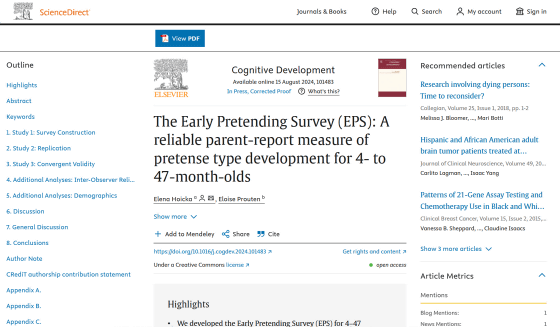Research shows that human children learn to 'play house' and 'pretend' surprisingly early

The skill of 'pretending' is not only useful for role play and house-playing as a child, but is also an important skill that can be useful throughout a child's life, such as acting like you're interested in the things your partner likes or showing your boss how enthusiastic you are at work. A new study of the development of children aged 0 to 4 years old has found that children learn to 'pretend' and 'pretend' at a surprisingly early age.
The Early Pretending Survey (EPS): A reliable parent-report measure of pretense type development for 4- to 47-month-olds - ScienceDirect

August: Babies pretending | News and features | University of Bristol
https://www.bristol.ac.uk/news/2024/august/babies-pretending.html
We Learn to Pretend Surprisingly Early in Our Lives, Study Shows : ScienceAlert
https://www.sciencealert.com/we-learn-to-pretend-surprisingly-early-in-our-lives-study-shows
A research team led by Elena Hojka , a professor of psychology at the University of Bristol in the UK, conducted a survey of 902 parents living in the UK, the US, Australia, and Canada about their children's behavior from birth to 47 months of age (3 years and 11 months). They asked parents about whether they engaged in 'pretend play' or 'pretending to be something,' and what kind of behavior they engaged in.
They found that children begin to understand some form of role play or pretending as early as four months of age, and by 13 months of age, about half of the children were pretending in some way.

The 'pretending to be something' behaviors performed immediately after birth included many that involved the baby's own body, such as 'pretending to sleep,' as well as gestures related to objects and actions, such as 'pretending to brush your teeth with your fingers,' 'pretending to drink water from an empty glass,' and 'mimicking some object or tool.'
And by the age of one, it has been reported that children begin to play pretend games, where they pretend to see one object as another, such as pretending to talk on a banana as a telephone. Heuka believes that this type of pretend play allows children to expand their sense of creative play.
Two-year-olds begin to show more abstract thinking and imitate actions that they would not normally do in their daily lives, such as 'flying a toy rocket.' They also begin to use their whole bodies to 'pretend to be trees, animals, other people, or cartoon characters.' Their language skills are also developing at this age, so they may create elaborate storylines to play with.
Finally, 3-year-olds begin to engage in highly creative pretend play, such as pretending to be a cartoon character flying through space or playing with imaginary friends. 'Our findings highlight how pretending is a complex and evolving process that begins very early in life and helps develop cognitive and social skills. Pretending is an important part of children's learning, creativity, friendships, and understanding of others,' said Heuka.

The current study relied solely on parental reports, which may not necessarily reflect the child's exact condition, but previous research has shown that parent reports correlate with laboratory observations.
The research team hopes that by investigating 'pretending' during children's development, parents and early childhood education teachers will be able to better understand children's development and support their learning, creativity, and friendships. 'With further research, these findings could be used as a diagnostic tool for differences in early childhood development,' said Heuka.
Related Posts:
in Science, Posted by log1h_ik







